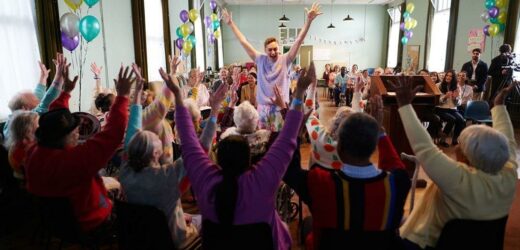Britain’s free and eternally beleaguered National Health Service has long been both a boost and a burden to the country’s political leaders. The present-day Conservative administration is only the latest to congratulate themselves on the progressive social generosity the NHS stands for — never more cynically than during the global pandemic — while cutting its funding and functionality at their convenience. A predominantly pro-NHS protest film that muffles its march with fluffy slippers, “Allelujah” also plays things two ways, and several times over. It didactically calls out governmental hypocrisy while exposing corrupt elements and inefficiencies within the precious institution itself. It hedges its bets politically between nostalgic keening for a kinder, fairer Britain of old and advocating for a top-down socialist makeover. It wavers tonally between cozy comedy and head-on polemic.
Richard Eyre’s film has, to be fair, inherited these inconsistencies from its source material: a 2018 play by revered octogenarian Alan Bennett that has been faithfully adapted by Heidi Thomas (her first feature screenplay since 2003’s “I Capture the Castle”) with the spirit of Bennett’s professed conservative socialism pretty much intact. (The play’s choreographed song-and-dance numbers have mostly been excised, however, which is probably for the best.) On stage, “Allelujah” was a quaint, curious experience, with Bennett’s signature chatty, heightened naturalism occasionally giving way to outright Brechtian artifice. It isn’t much more cohesive on camera, with a cast of big-name thesps further distancing viewers from the glum reality it presents: a gathering of Britain’s national treasures, in effect, in aid of the greatest national treasure of all.
The setting is the Bethlehem, a fictional hospital in the Yorkshire city of Wakefield that is a fairly recognizable amalgam of assorted hard-working, cash-strapped NHS facilities in the country’s less privileged regions. The pride of the Beth, as it’s locally called, is its dedicated geriatric ward, overseen by brisk, dour head nurse Sister Gilpin (Jennifer Saunders, sporting a thick, only intermittently convincing Northern accent), whose fearsome, unsentimental pragmatism operates in stark contrast to the softer, sweeter bedside manner of resident physician Dr. Valentine (Bally Gill), an Indian immigrant who has surrendered his real last name for something more pronounceable to his English colleagues and charges.
Such patronizing treatment hasn’t dimmed his rosy view of the Beth, stressed in a bookending voiceover that underlines his outsider’s idealism regarding Britain’s healthcare system — one that certainly isn’t shared by many of his elderly patients, or the hospital’s ministerial overlords from London, who are threatening it with closure. Urbane management consultant Colin (Russell Tovey) arrives at the Beth from the Big Smoke on two orders of business: first, to conduct a survey of the hospital’s efficiency and financial viability, and second, in a doozy of a contrivance, to visit his estranged father Joe (David Bradley), a former coal miner now occupying one of the geriatric ward’s scant beds.
A proud working-class lefty, Joe has never really come to terms with either his son’s homosexuality or his more centrist politics; that Colin is essentially in town to condemn the institution that’s caring for his dad is, needless to say, something of an obstacle to their weepy reconciliation. Might the young man’s familial investment in the Beth ultimately impact his assessment? Suffice to say that Bennett may be schooled in British theater, but he’s seen a Capra movie or two.
Patients with a less heavily ironic role to play in proceedings are drawn in rather more cursory fashion, many of them serving only as comic relief of the “old people say the darnedest things” variety. Ambrose, a former English teacher with airs who advises Dr. Valentine on grammatical manners, seems foregrounded in the script solely by virtue of being played (rather ripely) by Derek Jacobi. The marginal character of mousy ex-librarian Mary, meanwhile, seems unworthy of Judi Dench’s efforts until her role in a late-breaking narrative turn that catches the audience suitably off-guard without abetting or enhancing the film’s sociopolitical message in any meaningful way.
It’s left to the unremittingly saintly Dr. Valentine to remind us — via a strident breaking of the fourth wall, no less — that the NHS is worth protecting despite a few wrinkles and bad apples in the system. “Don’t dismiss us for what we cannot do,” he pleads, before stressing that the service and its staff are nothing less than “love itself.” It’s not exactly a searing rhetorical wallop, and few in the film’s self-selecting audience are likely to disagree. But “Allelujah” plays things safe anyway, never directly naming the political party putting the Beth under the cosh. Audiences won’t have a hard inferring it’s the same Tories that have been squeezing underprivileged people and councils for the last 12 years, even if the film’s view of modern Britain is tactfully non-specific — there’s little talk of Brexit or COVID to pin down proceedings. For the most part, “Allelujah” isn’t much for subtlety, from its plaintive activism to its broad-brush performances to its saccharine scoring. Why get coy here?
Read More About:
Source: Read Full Article


